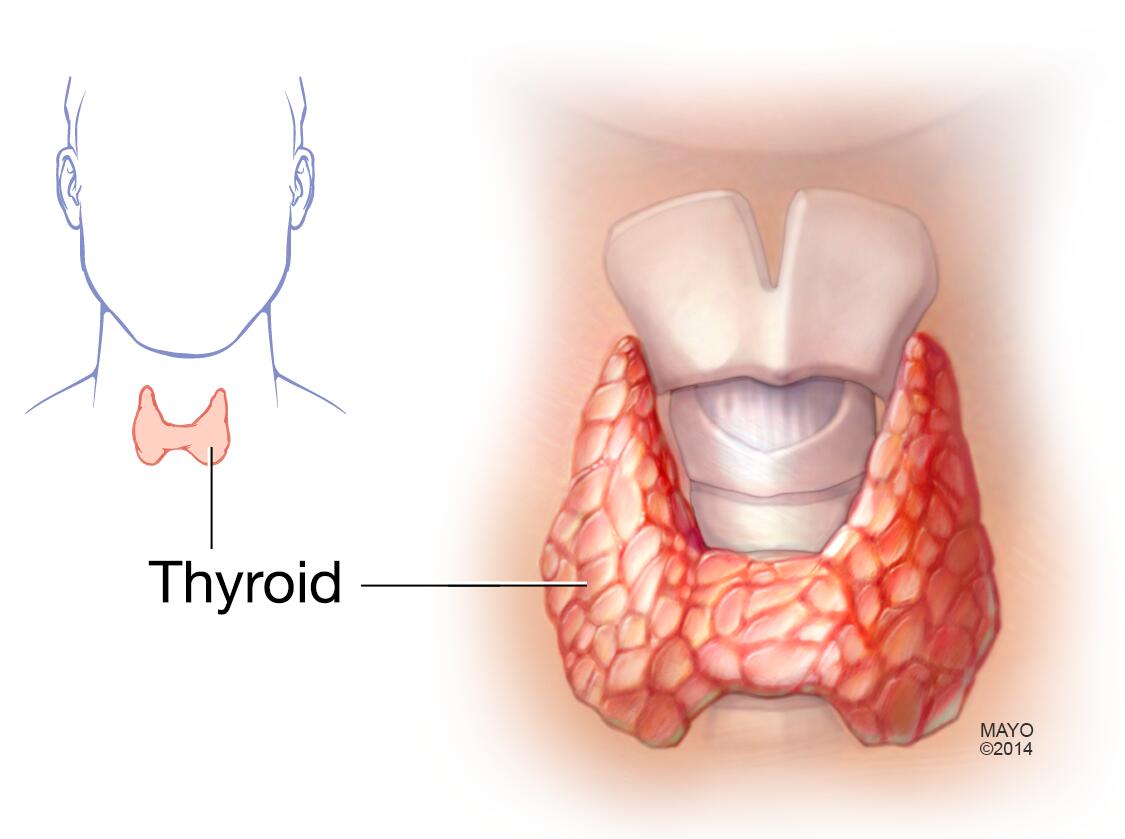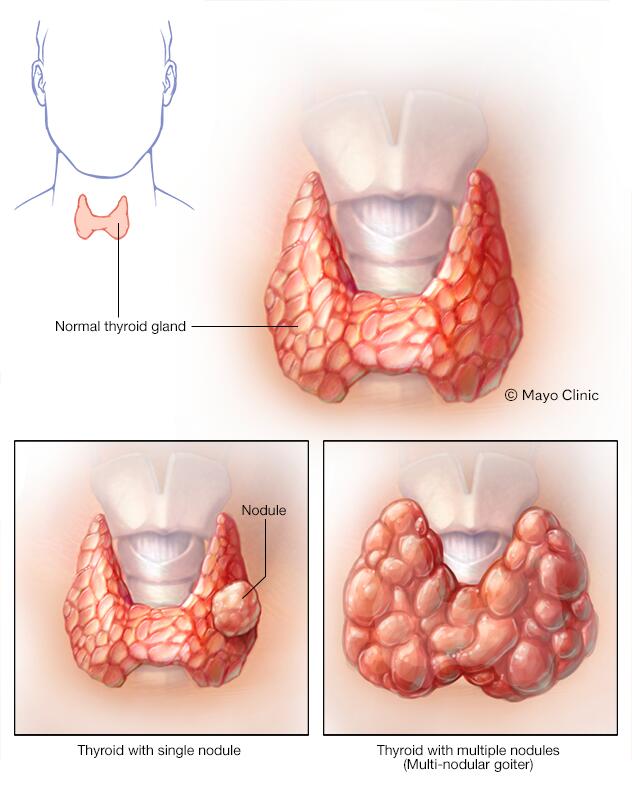Thyroid nodules
![]() August, 10th, 2023
August, 10th, 2023
Benefit Summary
Find out what can cause lumps in the thyroid gland and how your doctor may treat them.
Overview
, Overview, ,
Thyroid nodules are solid or fluid-filled lumps that form within your thyroid, a small gland located at the base of your neck, just above your breastbone.
Most thyroid nodules aren’t serious and don’t cause symptoms. Only a small percentage of thyroid nodules are cancerous.
You often won’t know you have a thyroid nodule until your doctor discovers it during a routine medical exam. Or your doctor may uncover it during a scan that was done for another health reason. Some thyroid nodules, however, may become large enough to be visible or make it difficult to swallow or breathe.
Treatment options depend on the type of thyroid nodule you have.

Most thyroid nodules don’t cause signs or symptoms. But occasionally some nodules become so large that they can:
- Be felt
- Be seen, often as a swelling at the base of your neck
- Press on your windpipe or esophagus, causing shortness of breath or difficulty swallowing
In some cases, thyroid nodules produce additional thyroxine, a hormone secreted by your thyroid gland. The extra thyroxine can cause symptoms of an overproduction of thyroid hormones (hyperthyroidism), such as:
- Unexplained weight loss
- Increased sweating
- Tremor
- Nervousness
- Rapid or irregular heartbeat
Only a small number of thyroid nodules are cancerous. But determining which nodules are cancerous can’t be done by evaluating your symptoms alone. Most cancerous thyroid nodules are slow growing and may be small when your doctor discovers them. Aggressive thyroid cancers are rare with nodules that may be large, firm, fixed and rapid growing.
When to see a doctor
Although most thyroid nodules are noncancerous and don’t cause problems, ask your doctor to evaluate any unusual swelling in your neck, especially if you have trouble breathing or swallowing. It’s important to evaluate the possibility of cancer.
Seek medical care if you develop signs and symptoms of hyperthyroidism, such as:
- Sudden weight loss even though your appetite is normal or has increased
- A pounding heart
- Trouble sleeping
- Muscle weakness
- Nervousness or irritability
Also see your doctor if you have signs and symptoms that may mean your thyroid gland isn’t making enough thyroid hormone (hypothyroidism), which include:
- Feeling cold
- Feeling tired more easily
- Dry skin
- Memory problems
- Depression
- Constipation
Causes
Several conditions can cause nodules to develop in your thyroid gland, including:
-
Overgrowth of normal thyroid tissue. An overgrowth of normal thyroid tissue is sometimes referred to as a thyroid adenoma. It’s unclear why this occurs, but it’s not cancerous and isn’t considered serious unless it causes bothersome symptoms from its size.
Some thyroid adenomas lead to hyperthyroidism.
- Thyroid cyst. Fluid-filled cavities (cysts) in the thyroid most commonly result from degenerating thyroid adenomas. Often, solid components are mixed with fluid in thyroid cysts. Cysts are usually noncancerous, but they occasionally contain cancerous solid components.
- Chronic inflammation of the thyroid. Hashimoto’s disease, a thyroid disorder, can cause thyroid inflammation and result in enlarged nodules. This often is associated with hypothyroidism.
- Multinodular goiter. The term goiter is used to describe any enlargement of the thyroid gland, which can be caused by iodine deficiency or a thyroid disorder. A multinodular goiter contains multiple distinct nodules within the goiter, but its cause is less clear.
-
Thyroid cancer. The chances that a nodule is cancerous are small. However, a nodule that is large and hard or causes pain or discomfort is more worrisome. You will likely want to have it checked by your doctor.
Certain factors increase your risk of thyroid cancer, such as a family history of thyroid or other endocrine cancers and having a history of radiation exposure from medical therapy or from nuclear fallout.
- Iodine deficiency. Lack of iodine in your diet can sometimes cause your thyroid gland to develop thyroid nodules. But iodine deficiency is uncommon in the United States, where iodine is routinely added to table salt and other foods.

Complications associated with some thyroid nodules include:
- Problems swallowing or breathing. Large nodules or a multinodular goiter can interfere with swallowing or breathing.
-
Hyperthyroidism. Problems can occur when a nodule or goiter produces thyroid hormone, leading to an excess amount of the hormone in the body. Hyperthyroidism can result in weight loss, muscle weakness, heat intolerance, and anxiousness or irritability.
Potential complications of hyperthyroidism include an irregular heartbeat, weak bones and thyrotoxic crisis, a rare but potentially life-threatening intensification of signs and symptoms that requires immediate medical care.
- Problems related to thyroid nodule surgery. If your doctor recommends surgery to remove a nodule, you may need to take thyroid hormone replacement therapy for the rest of your life.
Diagnosis
In assessing a lump or nodule in your neck, one of your doctor’s main goals is to rule out the possibility of cancer. But your doctor will also want to know if your thyroid is functioning properly. Tests include:
-
Physical exam. Your doctor will likely ask you to swallow while he or she examines your thyroid because a nodule in your thyroid gland will usually move up and down during swallowing.
Your doctor will also look for signs and symptoms of hyperthyroidism, such as tremor, overly active reflexes, and a rapid or irregular heartbeat. He or she will also check for signs and symptoms of hypothyroidism, such as a slow heartbeat, dry skin and facial swelling.
- Thyroid function tests. Tests that measure blood levels of thyroid-stimulating hormone (TSH) and hormones produced by your thyroid gland can indicate whether you have hyperthyroidism or hypothyroidism.
- Ultrasound. This imaging technique uses high-frequency sound waves to produce images of your thyroid gland. A thyroid ultrasound provides the best information about the shape and structure of nodules. Doctors may use it to distinguish cysts from solid nodules or to determine if multiple nodules are present. Doctors may also use it as a guide in performing a fine-needle aspiration biopsy.
-
Fine-needle aspiration biopsy. Nodules are often biopsied to make sure no cancer is present. During the procedure, your doctor inserts a very thin needle in the nodule and removes a sample of cells.
The procedure is usually done in your doctor’s office, takes about 20 minutes and has few risks. Often, your doctor will use ultrasound to help guide the placement of the needle. Your doctor then sends the samples to a laboratory to have them analyzed under a microscope.
-
Thyroid scan. Your doctor may recommend a thyroid scan to help evaluate thyroid nodules. During this test, an isotope of radioactive iodine is injected into a vein in your arm. You then lie on a table while a special camera produces an image of your thyroid on a computer screen.
Nodules that produce excess thyroid hormone — called hot nodules — show up on the scan because they take up more of the isotope than normal thyroid tissue does. Hot nodules are almost always noncancerous.
In some cases, nodules that take up less of the isotope — called cold nodules — are cancerous. However, a thyroid scan can’t distinguish between cold nodules that are cancerous and those that aren’t cancerous.
Treatment
Treatment depends on the type of thyroid nodule you have.
Treating benign nodules
If a thyroid nodule isn’t cancerous, treatment options include:
-
Watchful waiting. If a biopsy shows that you have a noncancerous thyroid nodule, your doctor may suggest simply watching your condition.
This usually means having a physical exam and thyroid function tests at regular intervals. It may also include an ultrasound. You’re also likely to have another biopsy if the nodule grows larger. If a benign thyroid nodule remains unchanged, you may never need treatment.
- Thyroid hormone therapy. If your thyroid function test finds your gland isn’t producing enough thyroid hormone, your doctor may recommend thyroid hormone therapy.
- Surgery. A noncancerous nodule may sometimes require surgery if it’s so large that it makes it hard to breathe or swallow. Doctors may also consider surgery for people with large multinodular goiters, particularly when the goiters constrict airways, the esophagus or blood vessels. Nodules diagnosed as indeterminate or suspicious by a biopsy also need surgical removal, so they can be examined for signs of cancer.
Treating nodules that cause hyperthyroidism
If a thyroid nodule is producing thyroid hormones, overloading your thyroid gland’s normal hormone production levels, your doctor may recommend treating you for hyperthyroidism. This may include:
- Radioactive iodine. Doctors use radioactive iodine to treat hyperthyroidism. Taken as a capsule or in liquid form, radioactive iodine is absorbed by your thyroid gland. This causes the nodules to shrink and signs and symptoms of hyperthyroidism to subside, usually within two to three months.
- Anti-thyroid medications. In some cases, your doctor may recommend an anti-thyroid medication such as methimazole (Tapazole) to reduce symptoms of hyperthyroidism. Treatment is generally long term and can have serious side effects on your liver, so it’s important to discuss the treatment’s risks and benefits with your doctor.
- Surgery. If treatment with radioactive iodine or anti-thyroid medications isn’t an option, you may be a candidate for surgery to remove the overactive thyroid nodule. You’ll likely discuss the risks of surgery with your doctor.
Treating cancerous nodules
Treatment for a nodule that’s cancerous usually involves surgery.
- Observation. Very small cancers have a low risk of growing, so it may be appropriate for your doctor to closely watch cancerous nodules before treating them. This decision is often made with the help of a thyroid specialist. Observation includes ultrasound monitoring and performing blood tests.
-
Surgery. A common treatment for cancerous nodules is surgical removal. In the past, it was standard to remove a majority of thyroid tissue — a procedure called near-total thyroidectomy. However, today more limited surgery to remove only half of the thyroid may be appropriate for some cancerous nodules. Near-total thyroidectomy may be used depending on the extent of the disease.
Risks of thyroid surgery include damage to the nerve that controls your vocal cords and damage to your parathyroid glands — four tiny glands located on the back of your thyroid that help control your body’s levels of minerals, such as calcium.
After a thyroid surgery, you’ll need lifelong treatment with levothyroxine to supply your body with thyroid hormone. Your thyroid specialist will help determine the correct amount to take because it may require more than hormone replacement to manage your cancer risk.
- Alcohol ablation. Another option for management of certain small cancerous nodules is alcohol ablation. This technique involves injecting a small amount of alcohol in the cancerous thyroid nodule to destroy it. Multiple treatment sessions are often required.
Preparing for your appointment
If you see or feel a thyroid nodule yourself — usually in the middle of your lower neck, just above your breastbone — call your primary care doctor for an appointment to evaluate the lump.
Often, your doctor may discover thyroid nodules during a routine medical exam. Sometimes, your doctor detects a thyroid nodule when you have an imaging test, such as an ultrasound, CT or MRI scan, to evaluate another condition in your head or neck. Nodules detected this way are usually smaller than those found during a physical exam.
Once your doctor detects a thyroid nodule, you’re likely to be referred to a doctor trained in endocrine disorders (endocrinologist). To get the most from your appointment, try these suggestions:
- Be aware of any pre-appointment restrictions. At the time you make your appointment, be sure to ask if there’s anything you need to do in advance to prepare for diagnostic tests you might have.
- Write down all symptoms and changes you’re experiencing, even if they seem unrelated to your current problem.
- Make a list of important medical information, including recent surgical procedures, the names of all medications you’re taking and any other conditions for which you’ve been treated.
- Make note of your personal and family medical history, including any history of thyroid disorders or thyroid cancer. Tell your doctor of any exposure to radiation you may have had, whether as a child or an adult.
- Write down questions to ask your doctor. For instance, you’ll likely want to know whether nodules that don’t cause problems need treatment, and what treatment options are available.
© 1998-2025 Mayo Foundation for Medical Education and Research (MFMER). All rights reserved. Terms of Use



